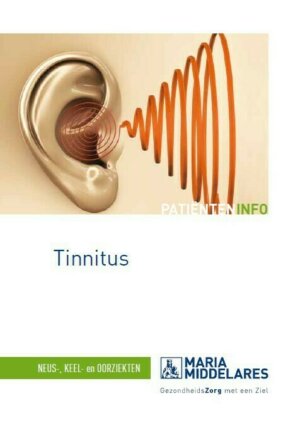Tinnitus recommendations
Symptoms and causes
Symptoms and causesWhat is it?
At this time, there are no foolproof treatments that work for all patients who have tinnitus. We can, however, often treat the underlying causes of the ringing in the ears. This can significantly change the severity of the tinnitus.
Each patient first attends a general consult at the Ear Nose and Throat (ENT) Department. The ENT physician and you will determineif it is reasonable to refer you to one or more services within the tinnitus service. The goal of treatment is to retrain the brain as much as possible so that it ignores the ringing.
Diagnosis and treatment
Diagnosis and treatmentThe tinnitus consultation comprises an ENT physician, two audiologists, a clinical psychologist and three physical therapists. This multidisciplinary approach allows us to focus the specific treatment on the factors that play a role in the development and worsening of your tinnitus.
You first come for an intake conversation wtih the questionnaires that you will have completed beforehand at home. The consultation starts with specific hearing tests with an audiologist to obtain a overall impression of your hearing and tinnitus. Next, you will learn how tinnitus works and how you can manage it as much as possible. You will also receive practical information about sound enrichment and, if necessary, about aids such as a noise generator or hearing aid.
If indicated, a physical therapist and/or tinnitus psychologist will perform an intake examination.
- The physical therapist performs an examination at the first appointment. On the basis of these results, you will be given an individual treatment plan, along with a combination of muscular and joint techniques to relax your muscles and to improve the mobility of the mandibular joint and the neck. With these tips and exercises, we strive to give you the right approach that you will be able to apply to your situation at home.
- During the first intake interview, the clinical psychologist explores what factors are important for you when dealing with tinnitus. Tinnitus can be accompanied by anxiety, stress, sleep disorders and even depressive symptoms. Our personality, environment, habits and even earlier experiences are important determinations of how we deal with problems. Some people barely notice their tinnitus while others experience quite a lot of trouble with it in their everyday life.
In that case, follow-up care with a clinical psychologist can be helpful. Attention is also given to stress management, coping with anxiety symptoms, ruminating thoughts, sleep problems, the acceptance of the fact that there is tinnitus and managing one's environment, among other things. After this consultation, there is a one-time follow-up appointment after six weeks. If desired, other conversation sessions can be scheduled.
Price
- ENT and Audiology
- The initial conversation with the audiologist, including the extra hearing tests and a short consult with the ENT physician, costs approximately €75.00. You will also receive a certificate for help provided by health insurance compensation.
- Additional follow-up appointments cost approximately €40.00, including a consultation with the ENT physician and a certificate for the health insurance.
- Clinical Psychology
- The initial intake conversation costs €50.00. You will receive a hospital invoice for this appointment.
- In order to determine your needs, you may schedule brief conversations for €35.00, or a longer, hour-long conversation for €50.00.
- Physical therapy
- There is no difference between the intake and the follow-up conversations. Each consultation costs approximately €9.00. You will receive a hospital invoice for this appointment.
Leaflet
You may refer to all of this information in the leaflet below.
Only available in Dutch:

Tinnitus
DownloadQuestions?
- You may also telephone us at:
- ENT/Audiology: +32 09 246 83 00
- Psychology: +32 (0)9 246 35 75
- Physical Therapy: +32 (0)9 246 99 00
Centres and specialist areas
Centres and specialist areas
Something wrong or unclear on this page? Report it.
Latest publication date: 13/08/2024
Supervising author: Dr Vermeiren Judith




